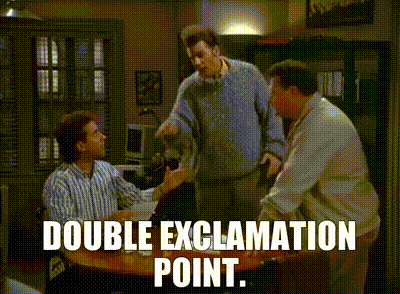After Jerry and Kramer notice that Barry Prophet, their accountant, was sniffing uncontrollably at Monk’s, they begin to suspect that he is a drug addict. Their fear of him being “hip to the whole bathroom scene” only increases when they subsequently discover that he has travelled to South America. Elaine, though, thinks that they have no proof and that all of their evidence is merely “speculation and hearsay.” Is this evidence actually hearsay?
Hearsay is an out of court statement offered to prove the truth of the matter asserted (FRE 801). What this means is that for something to be considered hearsay, it must 1) be a statement, 2) that was made out of court, and is 3) now being offered in court as proof for whatever is being asserted by the statement. For instance, if Jerry were on trial for having gotten Lena’s number off the AIDS Walk list, and Lena’s attorney put Susan on the stand, her testimony that George told her that Jerry got Lena’s number off the list would be considered hearsay. This is because it is a statement made out of court that is now being offered as proof of its own truth, i.e. that Jerry got the number off the walk list. Similarly, if Jerry were to sue George for having cheated during “the contest,” and wanted to testify that George admitted that he cheated, that too would be considered hearsay because it is a statement made out of court that is now being offered as proof for what the statement itself asserts (though both of these hearsay examples might still be considered admissible evidence because of the “opposing party statement” exception to the general hearsay rule).
There are two things that Elaine could be referring to when she says that “this is all speculation and hearsay.” The first is Barry Prophet’s sniffing at the diner, and the second is Prophet’s secretary’s assertion that he went to South America.
Let’s address the sniffing first. Sniffing is conduct, and conduct is generally not going to be considered hearsay because hearsay must be a statement. However, there is an exception for what’s known as assertive conduct (FRE 801). Assertive conduct is conduct which is designed to communicate something, and therefore it can be considered hearsay even though it is not actually a statement. As an example, when George flashes the secret sign to the Van Buren Boys he is trying to assert, with his conduct, that he is part of the gang. Even though it is an action, it could still be considered hearsay because it is, essentially, non-verbal communication. Here though it does not appear that Barry Prophet was trying to communicate anything with his “snowblowing.” He was just sniffing with his nose. Therefore, Prophet’s behavior at Monk’s is not going to be considered hearsay and Jerry could testify in court that he saw him sniffing.
The second thing Elaine may be referring to is the secretary’s assertion that Prophet had gone to South America. This also will not be considered hearsay so long as it is the secretary that testifies to this at trial and she had some kind of personal knowledge that Prophet really had gone to South America. This can be shown if she helped book his flight or saw his ticket (FRE 602). It would, however, be hearsay for Jerry to say that the secretary told him that Barry Prophet had gone to South America. This is because the secretary’s statement was made out of court and Jerry would be testifying to it in order to prove what the statement asserts, i.e. that Barry Prophet had actually gone to South America.
EDITOR’S NOTE: If you are confused about hearsay, it’s ok. It’s a complicated topic. We pledge to do additional posts about hearsay to further demonstrate this very intricate area of law.
While Elaine is wrong that the evidence against Prophet is hearsay, she is correct that it is all speculation as to whether he really does have a drug addiction. However, in American courts, the bar for admission of evidence is incredibly low. So long as the evidence is relevant and the probative value is not substantially outweighed by the prejudicial value (FRE 401 and 403), courts will admit almost anything as evidence. While things like living in the bathroom or using a lot of slang might not seem like much, they could still be admissible pieces of evidence. Even evidence of little value is still admissible for the jury to “suck down like Coca Cola.” It is up to the parties of a lawsuit to argue whether sniffing is a sign of drug use, a cold, or a mohair allergy.
And it is up to the jury to decide which party has put an exclamation mark on their case!



This could also raise the Hillmon Doctrine! If Barry had actually told his secretary that he was going to South America, such a statement could be admissible, not to show that he went to South America, but instead to show his actual intention was to go to South America.
This could also implicate the Hillmon doctrine! If Barry told his secretary that he was going to South America, that statement could be admissible as a hearsay exception offered to show Barry had the actual intention of traveling to South America.
Great Find!
What law(s) is/are Kramer breaking when he forcibly enters a [reasonably protected private area] bathroom stall to take a photo of the Sniffling Accountant?
That’s a great question! Likely some kind of Tort, as the Accountant certainly has some reasonable expectation of privacy. More interestingly, taking the picture of him may also create some legal liability, and if they sent that around then even perhaps criminal liability given NY’s recent revenge porn laws. We will investigation!
yes, I was wondering about the liability surrounding the whole “porn law” issue.
thanks for the answer!!
Glad we could help!!